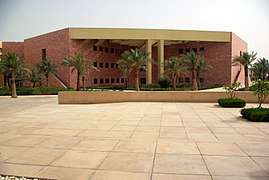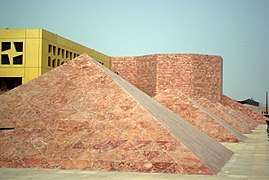Education City
Education City is an initiative of Qatar Foundation for Education, Science and Community Development. Located in Al Rayyan City on the outskirts of Doha, the capital of Qatar, Education City covers 14 square kilometers (5.4 square miles) and houses educational facilities from school age to research level and branch campuses of some of the world's major universities. Education City aims to be instructing students in fields of importance to the Gulf Cooperation Council region. It is also conceived of as a forum where universities share research and forge relationships with businesses and institutions in public and private sectors. Moza bint Nasser was a driving force behind the foundation and construction of Education City.
Education City is considered to be the Qatar Foundation's most important project.
History
Education City was launched by Qatar Foundation in 1997. The same year, Virginia Commonwealth University became the first institute to establish itself on its campus.[1] The city was officially inaugurated in 2003.[2]
Over the past twenty years, Education City has grown from a single school to a multi university campus with students from over 50 countries and an enormous research fund, offering endless opportunities for the advancement of knowledge and research across all disciplines.[3]
Institutions

Universities
Six American universities, one British university and one French university have branch campuses at Education City. It also has one Qatari university. They are:
- Virginia Commonwealth University in Qatar School of the Arts (VCUQ). Founded in 1998, VCUQ has offered students the opportunity to earn a Bachelor of Fine Arts degree (4 years) in fashion design, graphic design, interior design or painting and printmaking, a Bachelor of Arts (4 years) in Art History as well as a Masters of Fine Arts in Design Studies (2 years).
- Weill Cornell Medical College in Qatar (WCMC-Q). The Medical College was established by Cornell University in 2001 and offers a two-year pre-medical program followed by the four-year medical program leading to a Doctor of Medicine degree.
- Texas A&M University at Qatar (TAMUQ). TAMUQ was established in 2003 and offers undergraduate degrees in chemical, electrical, mechanical and petroleum engineering. As of 2011, it also offers a master's degree in chemical engineering.
- Carnegie Mellon University in Qatar (CMU-Q). CMU-Q has since 2004 offered undergraduate degrees in business, computer science programs, and as of 2007 an undergraduate degree in information systems. From Fall 2011, it has recently established a joint program with Weill Cornell Medical College in Qatar offering Biological Sciences and Computational Biology.
- Georgetown University School of Foreign Service in Qatar (SFS-Qatar). SFS-Qatar has, since 2005, offered a four-year program leading to a bachelor's degree in foreign service.
- Northwestern University in Qatar (NU-Q) began degree programs in journalism and communication in Fall 2008.
- HEC Paris began offering graduate executive education programs for mid-career and senior executives in 2011.
- University College London UCL Qatar arrived in 2011 and offers postgraduate degree programmes in the areas of archaeology, conservation, cultural heritage and museum studies.
- Hamad Bin Khalifa University (HBKU). Founded in 2010, the university is a member of the Qatar Foundation, and began graduating students in 2014. It was named after Sheikh Hamad bin Khalifa Al Thani, former Emir of Qatar (1995-2013). It has four colleges including College of Science and Engineering (CSE), College of Islamic Studies (CIS), College of Humanities and Social Sciences (CHSS) and College of Law and Public Policy (CLPP).[4]
Basic education
Other educational centers located at Education City include:
- Qatar Academy. QA offers an international education for boys and girls from preschool to university entrance. This is a school for students who have average or above average potential but have experienced academic problems; it assists students in developing compensatory skills for their individual learning differences. This is one of the earliest schools in Education City.
- Academic Bridge Program. Established in 2001, this center offers a university-preparatory program and aims to equip specially selected secondary school graduates for admission to degree programs of both Qatar Foundation's Education City campuses and other universities.
- Awsaj Academy. Established in 1996, Awsaj Academy, formerly known as The Learning Center, is a specialist school serving students with learning challenges in grades K-12. Awsaj is accredited by two internationally renowned Accrediting agencies: the Council of International Schools (CIS) and the Middle States Association (MSA).[5]
- Qatar Academy Sidra - QA Sidra offers an international education for boys and girls from preschool to university entrance and is in the IB Program. This is a school for students who have average or above average potential but have experienced academic problems; it assists students in developing compensatory skills for their individual learning differences.
Research
Several centers based at Education City focus on science and research. These include:
- RAND-Qatar Policy Institute, which analyzes complex policy problems and helps implement enduring solutions for clients across the Middle East, North Africa and South Asia.
- Qatar Science & Technology Park (QSTP), a state-of-the-art facility comprising 45,000 square meters of office and laboratory space. QSTP aims to fuel Qatar’s knowledge economy by encouraging companies from around the world to develop and commercialize their technology in Qatar, and by helping entrepreneurs to launch start-up technology businesses.
- Qatar National Research Fund (QNRF), which supports research that is in the national interest. It was established to provide opportunities for researchers at all levels, from students to professionals, in the private, public, and academic sectors. The first of its funding programs, the Undergraduate Research Experience Program, was launched in 2006.
- Sidra Medical and Research Center, a hospital and biomedical research center.[6]
Other centers
- Doha Debates, a public forum for dialogue modeled on the Oxford Union debates and broadcast on the BBC.
- Qatardebate, a youth civic engagement initiative which aims to foster a culture of debate and discussion in Qatar and the wider Arab World, creating 'debaters today, leaders tomorrow'.
- Al Jazeera Children's Channel (JCC), a pan-Arab youth television channel which aims to strike a balance between education and entertainment.
- Fitch studio, an extension of the Fitch London studio.
- Qatar Computing Research Institute is a research center established in 2010, which collaborates with Carnegie Mellon University in the form of joint seminar series and joint projects.
- Qatar National Convention Centre
Controversy
The American universities which have established campuses in Education City have been the subject of ongoing criticism of whether it is appropriate to maintain a campus in Qatar, given the alleged Qatari links to state-sponsored terrorism, the lack of freedom of speech in the country, and the country's absolute monarchy. In an interview with Gulf News Journal, Herbert London, president of the London Center for Policy Research and a senior fellow at the Manhattan Institute, said “universities I think have compromised themselves” by having campuses in a country like Qatar where academic freedom and freedom of the press are severely limited.[7]
Along with other universities with campuses in Qatar, Georgetown has received criticism for accepting money from Qatar due to their support of terrorism worldwide and their abysmal human rights record, especially in the lead up to the 2022 World Cup. Some question if universities who profit from campuses in Qatar are thereby complicit in Qatar’s alleged sponsorship of terrorism and human rights abuses.[8][9]
Academic freedom
In Qatar, the monarchy has absolute authority over all aspects of life, including its strict adherence to Sharia Law.[10] There are also strict censorship laws that at times have spilled over into Education City, despite the countries stated claims that the institutions there have total academic and intellectual freedoms.
In 2014, Love Comes Later, a book by Mohanalakshmi Rajakumar, English professor for Georgetown Qatar, Northwestern Qatar, and VCU Qatar, was banned by the State of Qatar with no explanation.[10] Rajakumar has stated that she wrote the book with the Qatari “sensibilities of the public culture” in mind, meaning that the book did not include the main three objections: sex, atheism, and politics.[11] Some art that has been displayed at VCUarts Qatar has had to be taken down as some Qatari students found it to be disrespectful to their culture, an issue that reflects the differences in conservatism and social practices that are present at the Qatari campus.[12]
In an article by The Washington Post, Susan Dun, an assistant professor of communication at NU-Q said that some professors do exercise caution with statements, written work, or speeches that may reach a wider audience than just the Education City community.[13]
Everette Dennis, the dean of NU-Q led a six-nation survey in 2015 that was financed by the Qatar National Research Fund and asked questions such as if people think their country is “headed in the right direction”. While the UAE, Egypt, Tunisia, Lebanon and Saudi Arabia all had answers to the question, there was no data from Qatar as the government blocked the question from being asked to survey participants.[12]
Freedom of Speech
Students at Northwestern have said that they face challenges due to the lack of first amendment rights protecting the media. Students have been harassed and intimidated when trying to capture images that would be considered routine or not offensive in the U.S. Some faculty members maintain that this teaches students persistence and creativity in overcoming obstacles to report on a story.[12]
Gallery
References
- ↑ Dominic J. Brewer; Catherine H. Augustine; Gail L. Zellman; Gery W. Ryan; Charles A. Goldman; Gery Ryan (2007). Education for a New Era: Design and Implementation of K-12 Education Reform in Qatar. RAND Institute Qatar. pp. 27–28.
- ↑ "Her Highness Sheikha Moza bint Nasser". Qatar Foundation. Retrieved 9 September 2015.
- ↑ "Qatar Foundation | Learning From Education City". www.qf.org.qa. Retrieved 2018-04-28.
- ↑ "Hamad Bin Khalifa University, Qatar | Official website". www.hbku.edu.qa. Retrieved 2017-02-23.
- ↑ http://www.tlc.edu.qa/about-tlc
- ↑ Fazeena Saleem (15 January 2018). "Sidra Medicine opens hospital building". The Peninsula. Retrieved 18 July 2018.
- ↑ "Roots of American universities grow deeper in Qatar, drawing criticism". Gulf News Journal. 2015-06-08. Retrieved 2016-05-13.
- ↑ "Advocate questions motive behind Qatar's financial ties to U.S. colleges". Gulf News Journal. 2016-04-08. Retrieved 2016-05-13.
- ↑ "While U.S. universities see dollar signs in Qatari partnerships, some cry foul". Gulf News Journal. 2015-09-24. Retrieved 2016-05-13.
- 1 2 Anderson, Nick (2015-12-06). "In Qatar's Education City, U.S. colleges are building an academic oasis". Washington Post. Retrieved 2016-06-21.
- ↑ Kapsidelis, Karen (2014-03-15). "Qatar bans novel by VCU professor". The Roanoke Times. Richmond Times-Dispatch. Retrieved 2016-06-21.
- 1 2 3 "In Qatar's Education City, U.S. colleges are building an academic oasis". Washington Post. Retrieved 2016-05-13.
- ↑ "Can U.S. universities thrive in the Persian Gulf? These scholars say yes". Washington Post. Retrieved 2016-05-13.
| Wikimedia Commons has media related to Education City. |
Coordinates: 25°18′54″N 51°26′03″E / 25.31500°N 51.43417°E



